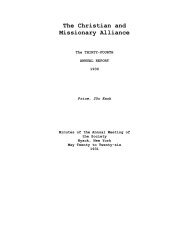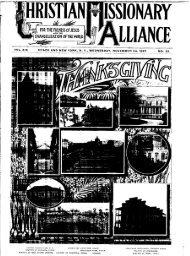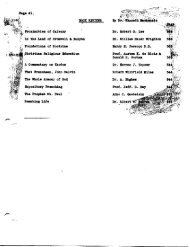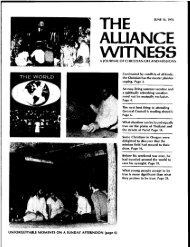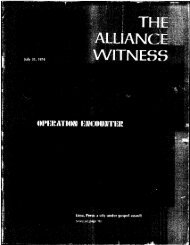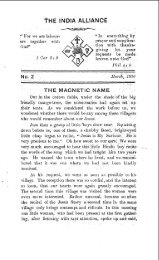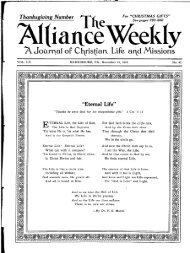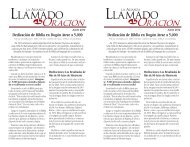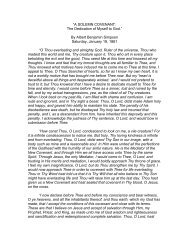Jewish Contributions to Christmas - Christian and Missionary Alliance
Jewish Contributions to Christmas - Christian and Missionary Alliance
Jewish Contributions to Christmas - Christian and Missionary Alliance
You also want an ePaper? Increase the reach of your titles
YUMPU automatically turns print PDFs into web optimized ePapers that Google loves.
his brother's righteous" (1 John 3:<br />
12). Divine acceptance of Abel's<br />
blood offering drew the envy of Cain<br />
whose offering, though doubtless<br />
bcautiful <strong>to</strong> behold, was rejected by<br />
the Lord.<br />
Strangely, not only have the bad<br />
envied the good, but the good have<br />
envied the evil. The psalmist warns:<br />
"Neither be thou envious against the<br />
workers of iniquity" (37:l).<br />
Socrates called envy the daugh-<br />
ter of pride. Pride is basically com-<br />
petitive. Subjection <strong>to</strong> secondary spot<br />
may cause hurt pride <strong>to</strong> lash out at<br />
the person at thc peak.<br />
A husb<strong>and</strong> complained that his<br />
wife always captured the limelight in<br />
social gatherings. If she was not play-<br />
ing the piano, she gathered others<br />
around her by her sparkling conver-<br />
sation. Perhaps the wife needed some<br />
help for her overdesire for attention.<br />
Likely thc husb<strong>and</strong>'s jealousy could<br />
be explained by C. S. Lewis's obser-<br />
vation: "We dislike the big noise at<br />
the party because we want <strong>to</strong> be the<br />
big noise." Bacon wrote: "Those are<br />
most subject <strong>to</strong> envy which carry<br />
their fortune in an insolent <strong>and</strong> proud<br />
manner."<br />
In modern usage envy <strong>and</strong> jealousy<br />
are frequently synonymous. Tech-<br />
nically a distinction exists. Let us<br />
pause in our dissection of envy's in-<br />
gredients <strong>to</strong> note this difference.<br />
Some jealousy is justifiable. Warn-<br />
ing against idolatry, Jehovah said: "I<br />
the Lord thy God am a jealous God"<br />
(Exodus 20:5). The Lord will not<br />
take second place in our interests,<br />
rightfully jealous of His prerogative<br />
of first claim in our lives. Likewise a<br />
husb<strong>and</strong> can be legitimately jealous<br />
over his right <strong>to</strong> exclusive devotion<br />
of his wife.<br />
However, most jealousy is unjusti-<br />
fiable, creeping <strong>to</strong>o easily in<strong>to</strong> Chris-<br />
tian circles: the pas<strong>to</strong>r who cannot<br />
accept the possibility that his assistant<br />
may outpreach him; the veteran or-<br />
ganist who cannot bear the thought<br />
that a newcomer <strong>to</strong> the church may<br />
play as well as she; the deacon who<br />
does not wish <strong>to</strong> give up his office<br />
<strong>to</strong> that capable gentleman who was<br />
a deacon in the church from which<br />
he just came. Like envy, jealousy<br />
involvcs potential inferiority <strong>and</strong><br />
wounded pride.<br />
Some dictionaries list cove<strong>to</strong>u.7<br />
<strong>and</strong> envious as synonyms. Though re-<br />
lated, they differ. We covet things;<br />
we envy people. Cove<strong>to</strong>usness usu-<br />
ally precedes envy. Cove<strong>to</strong>usness<br />
longs for another's possessions. Un-<br />
less checked, this cove<strong>to</strong>usness results<br />
in envy stabbing out at the owner of<br />
the objects we covet.<br />
Cove<strong>to</strong>usness <strong>and</strong> envy often co-<br />
exist but usually one predominates.<br />
If our desire focuses on thc acquisi-<br />
tion of position, power, prestige,<br />
money, achicvcment or pleasure, cov-<br />
e<strong>to</strong>usness is the main element in our<br />
preoccupation. When Judas sold the<br />
Master for thirty pieces of silver,<br />
cove<strong>to</strong>usness was his downfall. But if<br />
our feeling is aimed at the person<br />
possessing these coveted items, envy<br />
is the principal componcnt. Whcn the<br />
Pharisees delivered Jesus <strong>to</strong> Pilate,<br />
The Star in the East -<strong>and</strong> Jesus<br />
though coveting His power, popular-<br />
ity <strong>and</strong> accomplishments, the domi-<br />
nant fac<strong>to</strong>r was envy striking out at<br />
His person.<br />
Abasement at another's superiority<br />
need not lead <strong>to</strong> cnvy. It may stir<br />
<strong>to</strong> emulation. A person who says, "I<br />
cnvy you. I wish I had what you<br />
have. But I'm glad for your sake,"<br />
misuses the word envy. Genuine envy<br />
involves ill will, whereas the preced-<br />
ing remark expresses only good<br />
wishes. If acknowledgment of an-<br />
other's superiority leads <strong>to</strong> harder<br />
work for greater success <strong>to</strong> equal or<br />
surpass this friend with no wish or<br />
intent <strong>to</strong> downgrade him, this is per-<br />
missible emulation, not poisonous<br />
cnvy.<br />
Ambition <strong>to</strong> forge ahead is not<br />
wrong. Emulation is a noble trait,<br />
consisting in imitation of something<br />
excellent, scorning <strong>to</strong> fall short of the<br />
copy. However, in striving <strong>to</strong> outdo<br />
it, cmulation does not malign or de-<br />
press its copy but puts the emphasis<br />
"Where is he that is born King of the Jews?" the Wise Men asked<br />
King Herod. "We have seen his star in the east, <strong>and</strong> an come<br />
<strong>to</strong> worship him."<br />
The star had produced an amazing change in these men. It <strong>to</strong>re<br />
them from their chairs, drove them out from their observa<strong>to</strong>ries<br />
<strong>and</strong> made them do things quite foreign <strong>to</strong> their profession.<br />
It sent them out on a hazardous mission, for they could see<br />
the star only at night, <strong>and</strong> they were compelled <strong>to</strong> traverse those<br />
dangerous Oriental roads in the darkness.<br />
That wonderful star was prophetic of what Jesus does <strong>to</strong> peo-<br />
ple. Christ breaks in<strong>to</strong> people's lives in a most revolutionary way.<br />
He tears us away from the anchorage of old habits. He breaks us<br />
away from ecanomic <strong>and</strong> materialirtic securities <strong>to</strong> make us<br />
breathless adventurers in the world.<br />
Yes, Christ is the Divine Disturber! But He will not spoil your<br />
life. He will give you life's true nectar. His converting influence<br />
in your life will make you a better husb<strong>and</strong>, a better wife, a<br />
better citizen, neighbor, worker. You will become trustworthy,<br />
easy <strong>to</strong> get along with, full of divine love that will work seven<br />
days a week.<br />
Let Him do it far you now!-William E. Allen.<br />
If you need spiritual help, contact your local CBMA pas<strong>to</strong>r or wrire<br />
THE ALLIANCE WITNESS<br />
260 West 44th St., New York, N. Y. 10036



